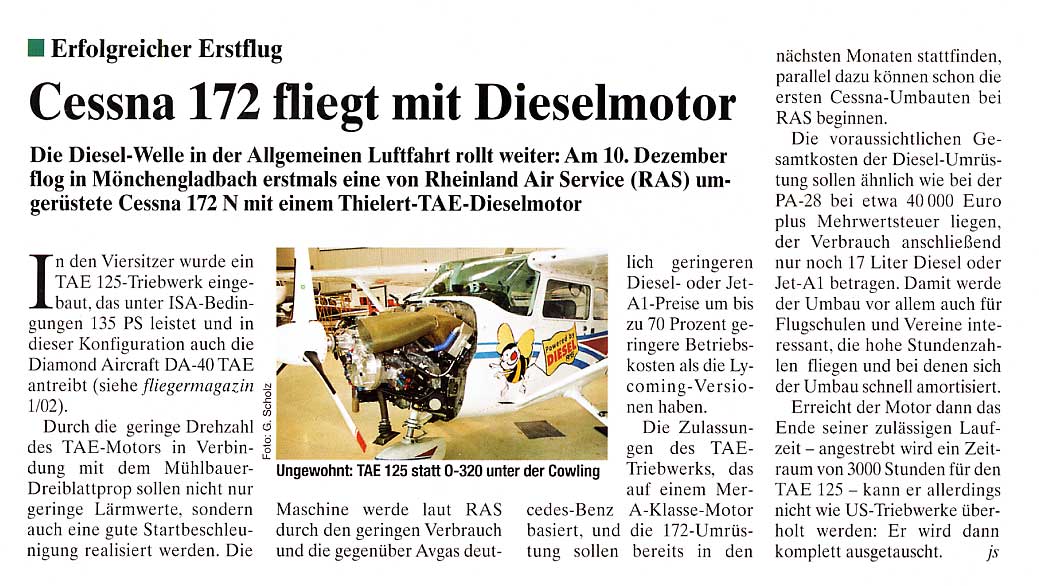
U.S. light aircraft manufacturers Maule Air and Cirrus
Design Aircraft are the first two customers for the new Societe de Motorisations
Aeronautiques (SMA) SR305 diesel engine. This piston engine will power Maule’s
M-7 single-engine series and Cirrus’ SR21tdi, derived from the SR22.
Cirrus reportedly has ordered an initial 30 engines, but the size of the Maule
order has not been disclosed. Socata has ordered 100 of the new engines for its
TB20GT series and other sizable contracts are anticipated shortly. The engine
has also been developed with Piper, Mooney and Raytheon Beech light aircraft in
mind.
According to Maule, first deliveries of the M-7 will occur at the end of this
year. Cirrus has said that the first four-seat SR21tdi would be delivered in
2002.
The SR305 engine completed European certification on April 20. At a ceremony in
Paris last Monday, the certificate was presented to SMA chairman and CEO
Jean-Marc de Raffin Dourny by René Gaudin, of the French civil aviation
authority’s certification department.
“We have good reasons to hope that our engine will be certified in the U.S.
before the end of this year,” SMA’s marketing and communications manager Miriam
Dunn told Aviation International News.
To date, more than 8,250 hr have been logged on the test bench,
including brake, propeller, equipment and endurance evaluation. The engine has
also flown 120 hr on both the Socata TB20 and a Cessna 182.
The SR305 is a turbocharged, four-stroke, direct injection engine. Unlike most
piston engines, it operates on kerosene instead of avgas. The four flat,
305-cu-in. cylinders produce 230 hp at 2200 rpm. The turbocharger is a Garrett
GT35.
The engine has a conventional tulip-type intake and exhaust valves. These are
reported to be about 13 lb lighter than those of the Lycoming IO-360 piston
engine.
The new powerplant’s digital engine control has a mechanical backup. The single
lever controls both power and propeller pitch.
“Fuel consumption is expected to be 30 percent less than that of equivalent
gasoline engines,” said Dunn, adding that the SR305 will also have about
one-third fewer parts than competitors. “An onboard computer will allow reduced
inspection frequency and maintenance hours. Maintenance and reliability goals
are impressive with a targeted TBO of 3,000 hours.”
According to SMA, the SR305 boasts better climb performance and power retention
at altitude, thanks to the turbocharger. The company believes this justifies the
new engine’s high list price, which at $80,000 is 30 percent higher than
equivalent Textron Lycoming or Teledyne Continental models.
“Our objective in the next three years is to market 2,000 engines per year,
mostly in the U.S.,” said Dunn. Even more ambitiously, SMA is targeting 10,000
annual SR305 sales by 2010–some 70 percent of which are expected to come from
North America. The production buildup schedule calls for 300 units to be
delivered next year, followed by 1,000 in 2003, doubling to 2,000 in 2004 and
then rising to 10,000.
Since 1999, SMA has been developing a technical and commercial partnership with
Daytona Beach, Florida-based Embry-Riddle Aeronautical University. The SR305
engine is undergoing tests on a Cessna 182.
A supplemental type certificate (STC) is being prepared by Speed Merchants of
Vero Beach, Florida. The company has launched an additional STC program on the
Socata TB 20GT in France.
The equal shareholders in SMA are European Aeronautic Defence and Space (EADS),
Renault Sport (a subsidiary of automaker Renault) and French aero engine group
Snecma. Since February 2000, SMA has been based in Lognes, near a general
aviation airport in the Paris area. It employs 45 people and should have a
70-strong workforce before the end of 2001. Negotiations are under way to
develop a new production facility at Bourges in central France.
The SR305 will encounter fierce competition from Teledyne
Continental and DeltaHawk, both of which have declared their intention to enter
the emerging market for general aviation diesel engines. By contrast,
Lycoming–the present world leader with as much as 80 percent of the market–seems
to have slowed down its diesel research-and-development effort. For the time
being, SMA does not regard it as a direct threat.
The French company is now laying plans for 300-hp-plus, turbocharged,
six-cylinder diesel engine. It is expected to enter production by the end of
2003.
